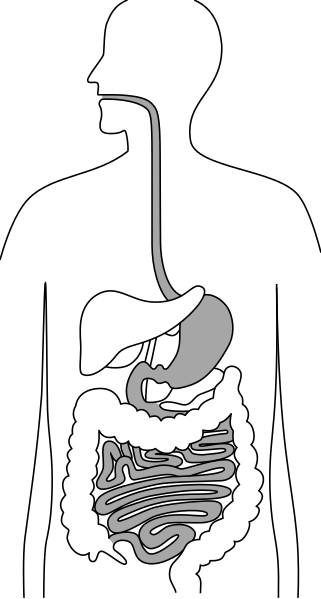I had an interesting experience the other day: while sitting
in the office of one of my favorite professors, my stomach kept interrupting the conversation. I’m
all about an open forum for new ideas, but my belly seemed to have only one
thing to say – “Food. Now.” So, red-faced, I asked if it’d be okay to continue
our talk while I munched on an apple.
Why do our stomachs growl? What possible purpose does it
serve? Do we really need an alarm system to tell us we haven’t eaten in a
while? I thought I’d do some digging.
Your Guts – A Brief Rundown
Anyone who has suffered from heartburn has learned that the
stomach is not behind the belly-button
as many cartoons would have us believe. In truth, your stomach is a grapefruit
sized sac just under the center of your ribs. In America, as many as 40% of adults suffer from GERD (gastrointestinal reflux disease.) Those with GERD often report intense pain in their chests, and will misdiagnose
themselves as having heart problems.
Sometimes when I eat habanero or ghost pepper salsa, I think
my heart is going to stop, too.
 |
| "Why, yes, waiter - I could use a glass of water." |
Your stomach has pure acid inside it – hydrochloric acid to
be precise. Some foods, such as citrus, tomatoes, and peppers can increase the amount of acid. The good news is that your stomach has a mucous layer to protect itself from these occasional flare-ups. Yes, you read that right –
boogers in your belly is a good thing.
The bad news is that if you’re
frequently adding acid to the stomach (like I do,) you’re bound to burn out
that layer eventually. Messing with acid content can lead to stomach ulcers,
which is where the mucous runs out and a hole is burned through the lining. Or, high
acid content can slip through the top of the stomach and spill into the
esophagus, causing heartburn, and potentially cancer.
This is why habitual vomiting by bulemics or alcoholics can
be dangerous, because it carries the acid into unprotected places in the body.
Belly boogers only go so far.
Heading south from the stomach are the upper intestines,
where the partially-digested food is treated with bile (the smelly stuff in
poop) to get rid of the acid. Then the mush makes a 20-22 feet journey through your upper intestines, where bacteria and villi (teeny little worm-like dudes
in the walls of your guts) strip the food of its vital nutrients – vitamins,
minerals, nutritional content, etc.
The final stage of the journey is the five foot span of
lower intestine, which includes the colon and rectum, where the now
nutrient-empty food is packed together and vacated from the body.
For more information on this process, please see the
world-renown medical text Everybody Poops.
Do You Hear What I Hear?
You can call is a growl, a grumble, or a rumbly-in-your-tumbly;
we all hear it eventually. Sometimes your stomach calls out for food when
you’re hungry. Other times you hear squishy noises after you’ve just finished
eating. Are these your stomach trying to send you complex signals? Can we learn
to speak intestine-ese and decode these squishy sounds?
No. Just no.
Even when you’re not eating, muscles are constantly churning
your stomach to aid digestion and moving along your intestines to push through
food. This muscle movement is called peristalsis. If there is air trapped in your gut, when your muscles cause motion, the motion can manifest as sound.
This video kind of freaks me out, but it illustrates two important points:
I'd argue that it also illustrates how we all look like space aliens from the inside, but I don't think that's what the video set out to do...
Anyway, your guts are making sounds all the time because they’re always moving. The difference is what’s inside them that’s blocking the noise. If you shake a piggy-bank that has only a few quarters in it, that piggy-bank is going to make a ton of noise. But, if you save your money and stuff that pig to the brink, shaking it won’t cause as much noise because there’s no empty space for the sound to rattle through.
So if you're full, the noise is dampened. It's not that your stomach makes noise to alert you to being hungry, it's that it makes noise all the time. You only really hear it when you need food.
- Your intestines move food along with muscle contractions similar to squeezing a tube of toothpaste.
- Air pockets (as evidenced by the empty spaces in the video) are very common and not harmful. No need to worry about belly balloon-animals.
I'd argue that it also illustrates how we all look like space aliens from the inside, but I don't think that's what the video set out to do...
Anyway, your guts are making sounds all the time because they’re always moving. The difference is what’s inside them that’s blocking the noise. If you shake a piggy-bank that has only a few quarters in it, that piggy-bank is going to make a ton of noise. But, if you save your money and stuff that pig to the brink, shaking it won’t cause as much noise because there’s no empty space for the sound to rattle through.
So if you're full, the noise is dampened. It's not that your stomach makes noise to alert you to being hungry, it's that it makes noise all the time. You only really hear it when you need food.

Thanks for the info! :)
ReplyDeleteI need food now then.
ReplyDelete